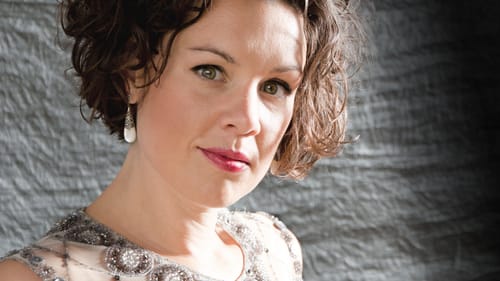Stay in the Loop
BSR publishes on a weekly schedule, with an email newsletter every Wednesday and Thursday morning. There’s no paywall, and subscribing is always free.
Sweet, spritely Baroque
Philadelphia Orchestra's 'Music for the Royal Fireworks,' with Emmanuelle Haïm and Lenneke Ruiten

“Heard melodies are sweet, but those unheard are sweeter,” wrote Keats, who might have added, “those unexpected are sweeter still.” This certainly was the case at last weekend’s Philadelphia Orchestra concert, featuring delightful French conductor Emmanuelle Haïm and soprano Lenneke Ruiten. It was one of the most enchanting musical events I’ve attended this, or any, year.
Haïm immediately shook my modest expectations for a polite program of Purcell and Handel to the core. Maestro Haïm, founder of Le Concert d’Astrée, led the orchestra’s forces (reduced by half) with radiant enthusiasm and joy.
Indeed, a wave of good humor and lightness rippled through the orchestra, beginning with the opening Fairy Queen selections by Purcell, through Handel’s familiar Music for the Royal Fireworks, and reaching a culmination of pleasure and abandon in Handel’s sensuous The Delirium of Love, an amorous poem sung with surpassing sweetness by Dutch soprano Ruiten.
Attending the Muse
The smaller scale of this performance, comparable to an early-music ensemble but with mostly modern instruments, made the short solo passages pop like bright flowers. The addition of two early-music performers — Sébastien Marq on recorders and Charles Weaver on theorbo — added exotic flair to a program that just got better as it unfolded over the course of two memorable hours.
Haïm led the orchestra in Purcell’s Fairy Queen selections with almost euphoric gratitude. Conducting the entire program without a baton, she held her bare arms up as though offering libations to the Muse. Those libations paid off with music that was heartfelt, shimmering, and appropriate both for the time in which it was written and our own.
Blended into the orchestra throughout all three compositions were the tones of Marq’s recorders: crisp, pleasantly piercing in the soprano, mellow and dramatic in the alto. What a master musician!
Ruiten, splendid in a sleeveless golden gown, was joined by the alto recorder and theorbo in the “Love’s Sweet Passion” aria of the Purcell selections. The buttery tones of Ruiten’s incomparable soprano melted into the air, in this work and in the final selection, Handel’s cantata on love. Her mastery of Baroque ornamentation is consummate, but her singing so pure, so evocative of the text, it seemed to clear a direct pathway to the heart, like one of Cupid’s arrows.
Those blooming-flower solo performances I mentioned earlier included several haunting passages played with finesse and good humor. David Kim, concertmaster, and Priscilla Lee, cellist, offered a touching obbligato to Ruiten’s repetition of the word forever, which is about the length of time I wanted to sit and listen.

Joseph Conyers’s elegant bass-playing made a standout addition to a work by a composer who, like Mozart, died young. His fresh voice of youth has been preserved in art for all time.
Explosive fireworks
Music for the Royal Fireworks sounded bright and energetic under Haïm’s leadership. What a treat for brass lovers. The trumpets (David Bilger, Jeffrey Curnow, Anthony Prisk, and Robert W. Earley) are the very backbone of this work, dazzling with Baroque brilliance. Three horns, a snare drum, and timpani brought a combination of majesty and swagger to this familiar piece.
Haïm was a model of the conductor-as-colleague, wandering through the orchestra during the concluding applause, directing the kudos to the musicians rather than herself.
After intermission, the concert culminated in a performance of Handel’s The Delirium of Love, a cantata for soprano and orchestra. During the Sunday matinee, the work began with oboist Peter Smith offering a pitch-perfect introduction to a work rich with deep feeling, decorative trills and tremolos appropriate to Baroque styling, and a lively pace.
A work of daunting difficulties, the cantata showcased Ruiten’s considerable vocal assets. At times, concertmaster Kim had as much to do as the soprano, and when the two voices merged as in the recitative and aria, “Let a thought fly up to heaven,” it was a kind of musical paradise. The orchestra and soloist returned for an encore, Handel’s “Il volo così fido,” from Riccardo primo, re d’Inghilterra.
A word about French recorder artist Sébastien Marq. One of Europe’s greatest recorder specialists, he teaches at the Paris Conservatory, conducts the conservatory’s Baroque orchestra, and teaches master classes in the Netherlands and Israel. It was a rare opportunity to hear this world-class musician, who not only brought his instrument but also contributed so much through his spritely physical presence and joie de vivre.
Of course, the one person to thank for this unexpectedly enchanting program was the modest conductor. This was Haïm’s debut with the Philadelphia Orchestra, and hopefully the start of a long, enjoyable relationship among all those, including the audience, who make up the musical experience.
What, When, Where
The Philadelphia Orchestra. Emmanuelle Haïm, conductor; Lenneke Ruiten, soprano; Sébastien Marq, recorder. Henry Purcell, Selections from The Fairy Queen, by Henry Purcell; Music for the Royal Fireworks and Il Delirio Amoroso (The Delirium of Love), cantata for soprano and orchestra, by George Frideric Handel. November 16-18, 2018, at the Kimmel Center's Verizon Hall, 300 S. Broad Street, Philadelphia. (215) 893-1999 or philorch.org.
Sign up for our newsletter
All of the week's new articles, all in one place. Sign up for the free weekly BSR newsletters, and don't miss a conversation.
 Linda Holt
Linda Holt